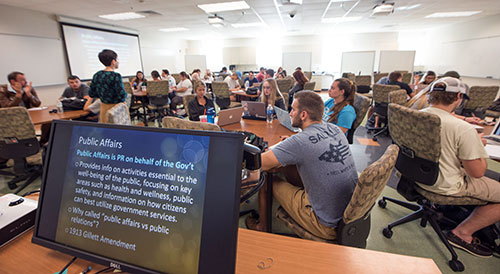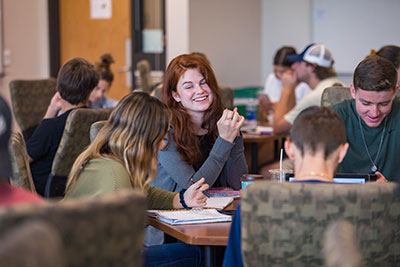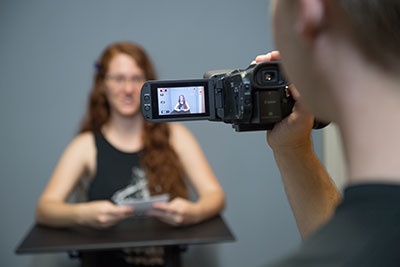Study Public Relations
Public Relations (PR) is the strategic communication process that companies and organizations use to coordinate advertising, media relations, social media, special events and digital communication.
 At Florida Gulf Coast University, students have two options to study public relations.
Students may major in:
At Florida Gulf Coast University, students have two options to study public relations.
Students may major in:
- Communication with a Concentration in Public Relations or
- Journalism with a Concentration in Public Relations
Both options provide students with the same hands-on PR courses designed to prepare students for entry-level jobs in a variety of fields, but the major core courses are slightly different. Either degree will prepare students to land a wide variety of post-graduate jobs or go on to graduate school.
Questions?
For more inquires and information, please reach out to one of faculty listed below.
To change your major/concentration, please reach out to the College of Arts & Sciences Advising Office.
About Public Relations
What is Public Relations?
Public Relations (PR) is the strategic communication process that companies and organizations use to build mutually beneficial relationships with the customers or important stakeholders who help them succeed.
Where are Public Relations jobs?
Public Relations professionals work at for-profit companies (both private and publicly traded), nonprofit organizations, government agencies and public relations firms. The industry offers a variety of specialty public relations opportunities like: healthcare, sports, fashion, beauty, music, celebrity, fundraising, advocacy and more.
What do Public Relations professionals do?
Public Relations professionals strategically plan and skillfully produce a full range of communication strategies and tactics, such as advertising, news releases, news conferences and media interviews, social media posts, influencer promotion, websites, brochures and flyers, photography, infographics, videos, email communication, newsletters, special events, collateral materials and more.
What’s the difference between Marketing and Public Relations?
Marketing and Public Relations professionals both want companies to sell products and nonprofits to raise money, but how they go about it is a bit different. Marketing uses shorter-term, sales-oriented strategies, whereas Public Relations aims to build long-term connections and engage customers/stakeholders by focusing more on brand awareness and loyalty than sales.
Communication B.A.
-
Career Path: Communication graduates are in high demand with jobs expected to grow by 6-7% through 2024. Communication graduates work in public relations, social media, mass communication, print and broadcast media, as well as affiliated industries including higher education, marketing, healthcare, sports, fashion, politics and law. The top career fields for communication graduates are PR, marketing, advertising, communications, sales and management.
- Core Courses: Effective Speaking, Foundations of Civic Engagement, Fundamentals of Communication, Theories of Human Communication, History of Rhetorical Theory, Interracial/Intercultural Communication and Internship.
- Concentration Option/Public Relations: Includes Principles of PR, PR Writing, PR Strategy, PR Research, PR Campaigns/Capstone courses and either Nonprofit PR or Advanced PR Writing.
- Concentration Option/Communication Studies: Includes Rhetorical Criticism, Interpersonal Communication, Persuasion and Propaganda, Communication and Gender, Communication and Negotiation and Senior Seminar.
Journalism B.A.
-
Career Path: Journalism graduates land jobs reporting, editing and presenting high-quality journalism in a variety of mass media platforms, such as newspapers, magazines, radio, television and Internet-based technologies. Job titles include reporter, copywriter, editor, anchor, photojournalist, social media specialist or digital news graphic designer. Journalists tell stories with text, video, audio, graphics and photos. Grounded in those storytelling skills, journalists often transition their careers to PR roles in corporations, nonprofit organizations and PR firms.
- Core Courses: News Literacy, News Production, Journalistic Writing, Journalistic Fact Finding, Internship, Senior Capstone, Grammar, Writing for a Mass Audience, News Reporting and Writing, Media Law and Ethics and Visual Storytelling
- Concentration Option/Public Relations: Includes Principles of PR, PR Writing, PR Strategy, PR Research, PR Campaigns/Capstone courses and either Nonprofit PR or Advanced PR Writing.
Florida Public Relations Association - FGCU Chapter
Find out more about the FGCU student-run organization (RSO) driven by their passion to learn everything they can while in school to help position them for careers in public relations once they graduate.
Meet Our Public Relations Specialists
Direct general questions or inquires to any individual below:




